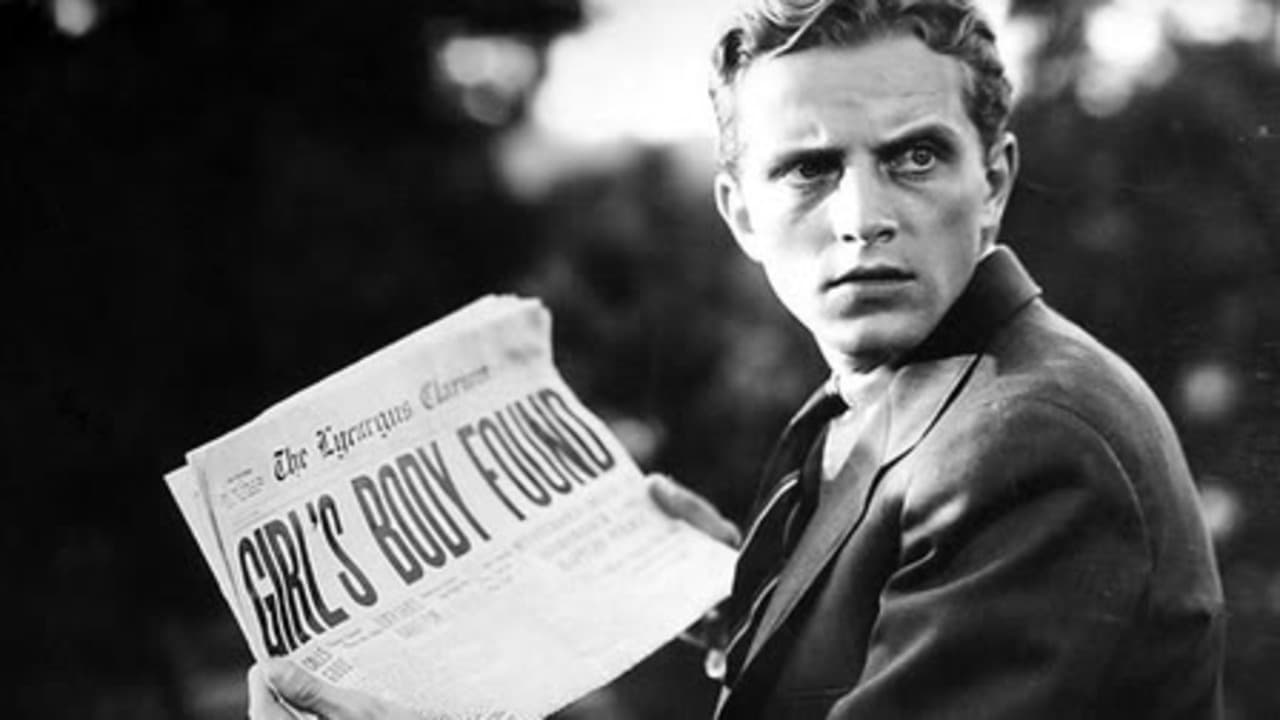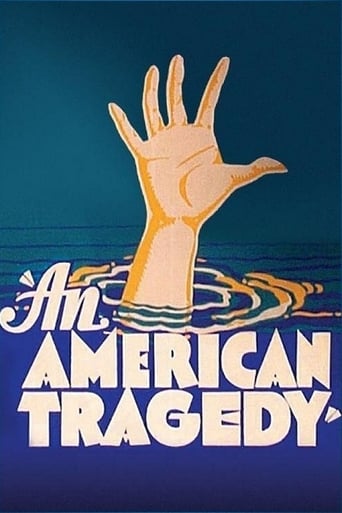Colibel
Terrible acting, screenplay and direction.
Protraph
Lack of good storyline.
CrawlerChunky
In truth, there is barely enough story here to make a film.
Allissa
.Like the great film, it's made with a great deal of visible affection both in front of and behind the camera.
Antonius Block
Based on the 1925 Theodore Dreiser novel of the same name, 'An American Tragedy' tells the tale of a young man (Phillips Holmes) who is nice enough on the surface, but is in reality slimy and weak. He's not a likable figure, and despite an upbringing from virtuous parents, lacks a moral compass. He flees the scene of a fatal hit-and-run early on in the film, and then uses a young factory worker (Sylvia Sidney), getting her pregnant. He lies to her about marrying her while pursuing an affluent woman (Frances Dee). It's a love triangle where we clearly feel empathy and attraction for the two women, and dislike for the man.The film is strongest in the scenes with Sidney or Dee, both of whom are beautiful and turn in strong performances, perfectly tuned to their characters. Where the film falls down is in its last 30 minutes, where the trial is far too long and has few moments of real interest. It's meant to be riveting as the District Attorney (Irving Pichel) and defense attorney (Emmett Corrigan) raise their voices dramatically, but instead it's tedious and dated. One wonders if the trial scenes were elongated following a successful lawsuit brought by Dreiser, one which distressed Director Josef von Sternberg so much that he disowned the picture. It's certainly the weakest part of the film, which is a shame given Sidney and Dee's performances.
MARIO GAUCI
A classic American novel (by Theodore Dreiser) that was twice brought to the screen by master film-makers but, while both were reasonably well-received (the second – George Stevens' A PLACE IN THE SUN {1951} – being even allotted 'masterpiece' status in some quarters), they were also criticized for failing to bring out the essence of their source material! For the record, I had watched the latter version ages ago but will be following this one with it – so, a direct comparison will certainly prove interesting; incidentally, I own two copies of the rare 1931 film and, while I obviously watched the one with superior image quality (acquired only hours prior to the viewing!), I still had to contend with a muffled soundtrack that occasionally rendered the dialogue unintelligible.Anyway, Sternberg was deemed the wrong director for this subject matter and, to be honest, the plot does feel somewhat dreary here – though the climactic trial undeniably compels attention (with the film's "Pre-Code" vintage being identified via a discussion of the soon-to-be taboo subject of abortion!). Incidentally, I have just stumbled upon the script which the great Soviet film-maker Sergei M. Eisenstein supplied, since he had previously been entrusted with the project for his American debut – which would subsequently never come to pass! Again, it would be fascinating to evaluate the two versions side-by-side but I do not have the time to go through the latter right now; if anything, I would love to check out Sternberg's celebrated autobiography "Fun In A Chinese Laundry" (which I also recently got hold of) to go along with my current retrospective of his work! As was Sternberg's fashion, the visual aspect of the film rather eclipses narrative concerns. Though the contemporary setting here precludes his usual emphasis on ornate sets and expressive lighting, he still employed one of Hollywood's most renowned cameramen in Lee Garmes (especially noteworthy are the ripple effect throughout the opening credits and his trademark use of sustained dissolves during scene transitions). On his part, the latter managed to externalize the protagonist's conflicted feelings by way of the various milieux in which he moved: mission, factory, hotels, high-society circles, country-side, courtroom and, finally, prison.This was just as well because stiff leading man Phillips Holmes (who looks an awful lot like Andy Warhol "superstar" Joe Dallesandro!) seems overwhelmed by the complexities of the role, which rather compromises audience identification with his plight! Incidentally, the script's attempt to pass this off as a problem picture was bizarre, to say the least – that said, the whole moralistic angle (which I do not think is present in the 1951 adaptation) led to a predictably serene conclusion, in which the anti-hero accepts the meting out of justice as his only possible fate. Even so, Dreiser was dissatisfied with how the film turned out (apparently ignoring the potent sociological element, he objected to the script's focus on the murder investigation) and took Paramount to court!; though his arguments were ultimately overruled, the studio still ordered considerable re-shoots…and, ironically, it was now Sternberg's turn to express dismay and he even went so far as to disown the released version! One of the two women with whom the protagonist is involved is played by Sylvia Sidney (this was made the same year her brief major period – including films for Mamoulian, Vidor, Lang, Hitchcock and Wyler – kicked off): she is excellent, with some even suggesting the actress deserved an Oscar for it!; her death scene is very similar to the botched murder attempt, also occurring during a would-be innocent boat ride, in another classic by an equally gifted film-maker i.e. F.W. Murnau's SUNRISE: A SONG OF TWO HUMANS (1927). The other girl is Frances Dee – whose essentially small part, however, is obviously much reduced in comparison to that of Elizabeth Taylor's in the (lengthier) remake but also to Sidney's here; she is excluded, for plot purposes, from the latter stages of the film – but it must be said that the overall compactness of sequences vis-a'-vis the remake was not an artistic choice but merely the prevalent style of the era! Also on hand to fill in the roles of the two formidable lawyers in the case (incorporating an unprecedented re-enactment of the accident, complete with boat and passengers!) are District Attorney Irving Pichel and Defense Counsel Charles Middleton.
filmsfan38
Its time this well acted and good story older little known gem to be released on DVD. I saw it on TV years ago but never saw it again. It was made in 1931 and the mores of the day are outdated, but the story and consequences could be the same today as they were then. The acting is well done with Phillips Holmes as the male star Clyde. Holmes died when he was only 35 in a plane collision, cutting short a promising life and film career. Sylvia Sydney plays the part of Clyde's very pretty girlfriend Roberta. Everything goes well till Roberta finds herself in a situation she doesn't want to be in and for sure, Clyde doesn't want her to be in. Clyde has big plans for his job, he is ambitious but also selfish. He begins to feel trapped and thinks what he can do to be free of the situation as he doesn't want to be held back. So he plans a solution which has sad consequences and doesn't work out the way he planned. The movie is close to Theodore Dresser's book of "An American Tragedy". The acting is well done by the two stars. I was surprised that a movie made in 1931 could be so good. It didn't seem out of date at all to me. In my view, the acting of the stars in the 1931 film and the movie itself is a lot better than the remake called "A Place in the Sun" with Clift Montgomery and Elizabeth Taylor.I think a lot of classic type film buffs would like this movie. I'd be the first to get it on DVD.
drednm
This seems much closer to the facts of Theodore Dreiser's great novel than the soapy 50s version, good in its own way, with Montgomery Clift.Even with florid Josef von Sternberg directing, the film follows the basic plot of the novel although there seem to be a few holes. Still, the courtroom scene is electric and makes this all worth it. I also like the casting of Phillips Holmes as Clyde. Holmes is able to capture the bizarre passions and inability to really care that embody Clyde. His subtle performance in the courtroom scenes, as he slowly breaks down and loses any sense of truth under the barrage of lawyers, is quite excellent. His voice goes higher and thinner as he becomes just a frightened boy answering the stupid questions posed by the sadistic and ambitious lawyers.Sylvia Sidney is quite good as the tragic Roberta, and Frances Dee captures the haughty attitudes of the wealthy of that era. Charles Middleton and Irving Pichel play the lawyers. And Lucille LaVerne plays Clyde's mother.This was a big hit in its day and helped establish Holmes and Sidney as stars. Holmes had a relatively short starring career and died in WW II but he made several memorable films with Nancy Carroll.

